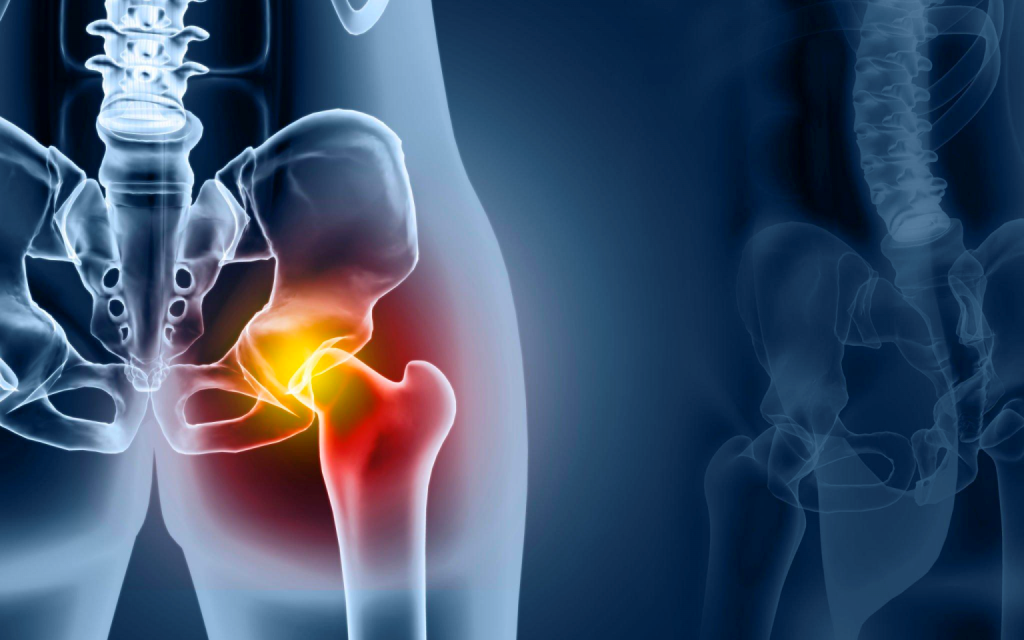Home » Guide to hip replacement surgery in Kolkata – Painless, scarless and faster

If you are contemplating hip replacement surgery, you likely have numerous questions and concerns. It can be particularly frustrating when you are grappling with the pain of your condition and have no one to turn to for answers. However, do not worry, as this blog can assist you in finding the answers you seek and guiding you through the process of hip replacement surgery.
The causes of hip joint inflammation, such as arthritis, avascular necrosis, or fractures, can degenerate the joint and result in chronic discomfort.
If you suffer from hip pain that doesn’t go away with nonsurgical treatments like physical therapy, medication, or lifestyle changes, you may need hip replacement surgery. Your doctor may recommend hip replacement surgery if other treatments haven’t helped and your pain is making it difficult to do everyday activities. In some cases, your doctor may recommend total hip replacement surgery, which involves replacing the entire joint with artificial parts.

Hip joint pain can come from a lot of different places.
The hip joint is a common source of pain for many people. Hip replacement surgery is a highly effective way to relieve this pain and improve the stability and connection between the bones in the hip joint. Many people worldwide report a significant reduction in pain after undergoing this procedure.
Hip replacement surgery involves the removal of a damaged hip joint and its replacement with an artificial joint made of metal and plastic components. The hip joint, which is composed of the pelvic bone’s socket (acetabulum) and a rounded bone (femur head), is a significant weight-bearing joint in the body. The artificial joint is designed to mimic the movement of a natural hip joint.
An orthopaedic surgeon performs total hip replacement surgery on a patient under general anaesthesia. Hospitalisation for a few days or weeks following the surgery may be required.
The main goal of hip replacement surgery is to improve the patient’s quality of life by reducing pain and restoring mobility. This surgery usually results in a significant decrease in pain and an increase in the ability to perform everyday activities such as walking, running, and climbing stairs. Some patients may also experience improved stability, balance, and posture.

Increased Quality of Life: Hip replacement surgery comes with a number of important advantages that enhance patients’ quality of life. Following surgery, many patients claim to feel more resilient, vivacious, and independent. In addition, they have a greater range of motion and feel less discomfort. Also, patients frequently stand and balance better.
Gained Mobility: Individuals who get hip replacement surgery gain this benefit as well. They can move more freely and with less pain and suffering, which makes it easier for them to carry out daily activities like walking, running, and climbing stairs. They can now engage in sports like biking and swimming that may have been difficult before the procedure.
Decreased Pain and Discomfort: Hip replacement surgery also helps to relieve the pain and discomfort that the ailment causes. The new hip joint relieves strain on the nearby tendons, ligaments, and muscles, which lessens stiffness and discomfort. In addition, patients can move with confidence and ease because of the new hip joint’s increased stability.
Confidence Boost: Having a hip replacement might also help a patient feel more confident. Patients can confidently participate in routine activities and pursue hobbies they may have put off before surgery with a robust and long-lasting joint. When combined with appropriate upkeep and care, this boosted confidence can result in a more fulfilling life.

The cost of hip replacement surgery in India can be cheaper than in other countries, but the price still depends on the city where the procedure is conducted.
If you plan to have the surgery in Kolkata, the cost of hip replacement surgery in Kolkata may range from Rs. 30,000 to Rs. 5,00,000.
Cost of the surgery in other metro cities of India
City
Price Range (Min-Max)
Ahmedabad
Rs. 7000 – Rs. 6,50,000
Bangalore
Rs. 55,000 – Rs. 7,00,000
Chandigarh
Rs. 3,00,000 – Rs. 5,00,000
Chennai
Rs. 90,000 – Rs. 5,00,000
Gurgaon
Rs. 30,000 – Rs. 5,00,000
Hyderabad
Rs. 70,000 – Rs. 8,00,000
Kolkata
Rs. 30,000 – Rs. 5,00,000
Mumbai
Rs. 47,000 – Rs. 8,00,000
New Delhi
Rs. 35,000 – Rs. 8,00,000
Noida
Rs. 70,000 – Rs. 3,00,000
Pune
Rs. 60,000 – Rs. 8,00,000
Hip replacement surgery in India usually costs between ₹1,50,000 to ₹2,50,000. This cost can be prohibitive for many patients who are unable to afford the procedure. Additionally, post-operative care and rehabilitation expenses can add up quickly.
Despite the costs, patients often find that the benefits of the procedure outweigh the expenses. Many report a significant improvement in their quality of life after surgery. For those in need, GMoney offers no-cost EMI medical loans for hip replacement surgery.

1. What is hip replacement surgery?
Hip replacement surgery is a medical procedure that involves replacing a damaged or worn hip joint with a prosthetic hip joint. This procedure is typically recommended for patients who have severe hip pain or stiffness that does not respond to other treatments.
2. What are the risks associated with hip replacement surgery?
While hip replacement surgery is generally safe when performed by a qualified and experienced surgeon, there are some risks to be aware of before deciding to undergo the procedure. Potential risks include infection, blood clots, dislocation, and nerve damage.
3. Is there a way to finance hip replacement surgery?
Yes. GMoney offers medical loans for hip replacement surgery that come with no-cost EMI and flexible repayment options, so you can pay without stressing about your budget.
4. What are the advantages of hip replacement surgery?
Hip replacement surgery can lead to improved mobility and quality of life for patients. It can also help relieve chronic pain and stiffness in the hip joint.
5. How much time does it take to recover after hip replacement surgery?
The recovery period for hip replacement surgery can vary, depending on the individual’s age, overall health, and the type of procedure performed. Generally, most patients can expect to return to their normal activities within two to three months after the surgery.
In conclusion, hip replacement surgery can have a very positive effect on the lives of people who are struggling with hip pain and mobility issues. There are several benefits to this surgery, which include relief from pain, increased mobility, and a better overall quality of life. However, there are also some drawbacks to consider, such as the recovery time and potential complications. Additionally, it’s important to be aware of the risks associated with delaying surgery as well as the long-term effects of untreated hip pain.
Disclaimer: THIS WEBSITE DOES NOT PROVIDE MEDICAL ADVICE.
Follow us
Reach us
Mumbai HO
GMoney Pvt. Ltd.
315, 215 Atrium,
Next to Courtyard by Marriott,,
A.K. Road, Andheri East,
Mumbai - 400093
Ph : +91 86570 00105, +91 72089 60444
Quick Links
Bengaluru
GMoney Technologies Pvt. Ltd.
Oyo Work Spaces, Umiya Emporium,
Opposite Forum Mall, Hosur Rd,
Koramangala, Bengaluru,
Karnataka 560029
Ph : +91 89717 34815
Delhi
GMoney Technologies Pvt. Ltd.
Berry Co Works, 1E/3,
Jhandewalan extension,
Next to jhandewalan metro station
gate no. 2 Barakhambha Road,
New Delhi, Delhi 110001
Ph : +91 97116 26832
Pune
GMoney Technologies Pvt. Ltd.
91 Spring Board, Sky Loft,
Creaticity Mall, Off, Airport Rd,
opposite Golf Course, Shastrinagar,
Yerawada, Pune,
Maharashtra 411006
Ph : +91 84250 28758
Chandigarh
GMoney Technologies Pvt. Ltd.
SCO no. 292,
First Floor, Sector 35D,
Chandigarh
Ph : +91 84279 82012
Jaipur
GMoney Pvt. Ltd.
CODESKK Civil Tower,121 122,
Pandit TN Mishra Marg,
Santhosh Nagar, Nirman Nagar,
Jaipur – 302019
Ahmedabad
GMoney Pvt. Ltd.
22nd Floor, B Block,
Westgate By True Value,
Nr. YMCA Club, SG Highway,
Ahmedabad – 380051
Hyderabad
GMoney Pvt. Ltd.
Dwaraka Pride,
Plot no. 4/1, Survey No. 64,
Huda Techno Enclave, Madhapur,
Hyderabad (Telangana) – 500081
Chennai
GMoney Pvt. Ltd.
DBS Business Center, 31A,
Cathedral Garden Rd, Badrikari, Tirumurthy Nagar, Nungambakkam, Chennai, Tamil
Nadu – 600 034
Mumbai HO
GMoney Pvt. Ltd.
315, 215 Atrium,
Next to Courtyard by Marriott,,
A.K. Road, Andheri East,
Mumbai - 400093
Ph : +91 86570 00105, +91 72089 60444
Bengaluru
GMoney Pvt. Ltd.
Oyo Work Spaces,
Umiya Emporium,
Opp. Forum Mall, Hosur Rd,
Koramangala, Bengaluru,
Karnataka - 560029
Ph : +91 72089 60444
Pune
GMoney Pvt. Ltd.
91 Spring Board, Sky Loft,
Creaticity Mall, Airport Rd,
Opp. Golf Course, Shastrinagar,
Yerawada, Pune,
Maharashtra - 411006
Ph : +91 72089 60444
Delhi
GMoney Pvt. Ltd.
Berry Co Works, 1E/3,
Jhandewalan extension,
Gate no. 2 Barakhambha Road,
New Delhi, Delhi - 110001
Ph :
+91 72089 60444
Chandigarh
GMoney Pvt. Ltd.
SCO No. 292,
First Floor, Sector 35D,
Chandigarh - 160022
Ph : +91 72089 60444
Ahmedabad
GMoney Pvt. Ltd.
22nd Floor, B Block,
Westgate By True Value,
Nr. YMCA Club, SG Highway,
Ahmedabad - 380051
Hyderabad
GMoney Pvt. Ltd.
Dwaraka Pride,
Plot no. 4/1, Survey No. 64,
Huda Techno Enclave, Madhapur,
Hyderabad (Telangana) - 500081
Jaipur
GMoney Pvt. Ltd.
CODESKK Civil Tower,121 122,
Pandit TN Mishra Marg,
Santhosh Nagar, Nirman Nagar,
Jaipur - 302019
Chennai
GMoney Pvt. Ltd.
DBS Business Center, 31A,
Cathedral Garden Rd, Badrikari,
Tirumurthy Nagar,Nungambakkam, Chennai,
Tamil
Nadu - 600 034
Pune | Mumbai | New Delhi | Kolkata | Chennai | Navi Mumbai| Bengaluru | Ahmedabad | Nagpur | Hyderabad | Jaipur | Lucknow | Bhopal | Bhubaneswar | Nashik | Indore | Ghaziabad | Kanpur | Amritsar | Vasai | Noida | Gurugram | Chandigarh | Ranchi | Cuttack | Thane | Kalyan | Jalandhar | Kolhapur | Visakhapatnam | Chakan| Greater Noida | Wagholi | Raipur | Panvel | Belgaum | Mohali | Bhiwandi | Talegaon | Coimbatore | Palghar | Mumbra | Sangli | Surat | Durgapur | Ludhiana | Kochi | Agra | Ahmednagar | Ajmer | Akola | Aurangabad | Baroda | Beed | Rewari | Patiala | Vellore | Ranjangaon | Nanded | Nellore | Panipat | Panjim | Madurai | Mysore | Mangalore | Korba | Mathura | Kalaburagi | Jalgaon | Kharar | Guwahati | Kollam | Jamshedpur | Gwalior | Saswad | Solapur | Varanasi | Salem | Sambalpur | Jodhpur | Hubli | Panchkula | Faridabad | Amravati | Ayodhya | Badlapur | Dehradun | Parbhani | Ujjain | Udaipur | Tiruchirappalli | Srinagar | Shimla | Secunderabad | Ratnagiri | Pandharpur | Ananthapuram | Buldhana | Hadapsar | Baramati | Chittoor | Darjeeling | Dhule | Fatehpur | Gandhinagar | Haridwar | Gorakhpur | Jhansi | Kanchipuram | Kartarpur | Kurukshetra | Pondicherry | Prayagraj | Bharuch | Bhusawal | Bathinda | Pathankot | Nandurbar | Niphad | Kolar | Ambala | Kota | Pendurthi | Jabalpur | Palwal | Bhilai | Bhiwani | Bilaspur | Patna | Rohtak | Phagwara | Malegaon | Vijayawada | Bikaner | Chiplun | Darbhanga | Roorkee | Bhor | Rajahmundry | Margao | Alwar | Dhanbad | Bulandshahr | Aluva | Mulshi | Davanagere | Kapurthala | Anantapur | Loni | Latur | Gondia | Chhindwara | Chandrapur | Dharmapuri-TN | Faridkot | Dharwad | Daund | Chaksu | Bareilly | Kakinada | Haldwani | Doddaballapur | Dindori-MH | Bagru | Kudus | Kozhikode | Gurdaspur | Bokaro | Berhampur | Batala | Barrackpore | Ramgarh | Meerut | Bassi | Dera Bassi | Howrah | Karjat Raigarh | Thiruvananthapuram | Bheemunipatnam | Ambegoan | Allahabad | Aligarh | Alappuzha | Tirupathi | Thoppumpady | Srikakulam | Siliguri | Rourkela | Mirzapur | Gadag | Bellary | Tumkur | Sonipat | Hoshangabad | Junnar | Jalna | Hisar | Karnal | Kottayam | Muzzafarnagar | Ramnagara | Thrissur | Bahadurgarh | Balasore | Baraut | Dhar | Ernakulam | Gadhinglaj | Chikodi | Vaniyambadi | Kamothe |